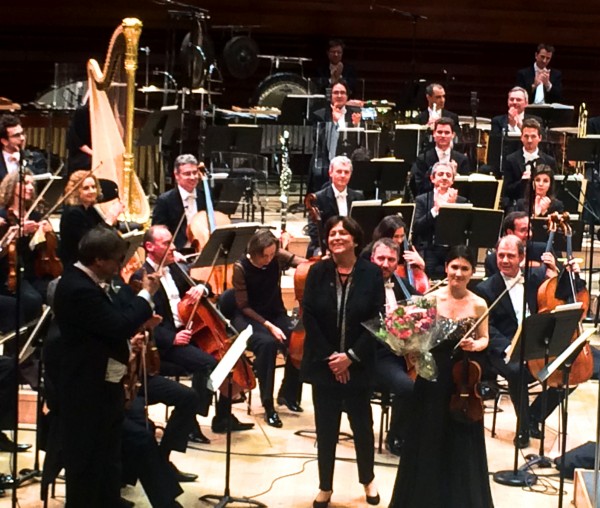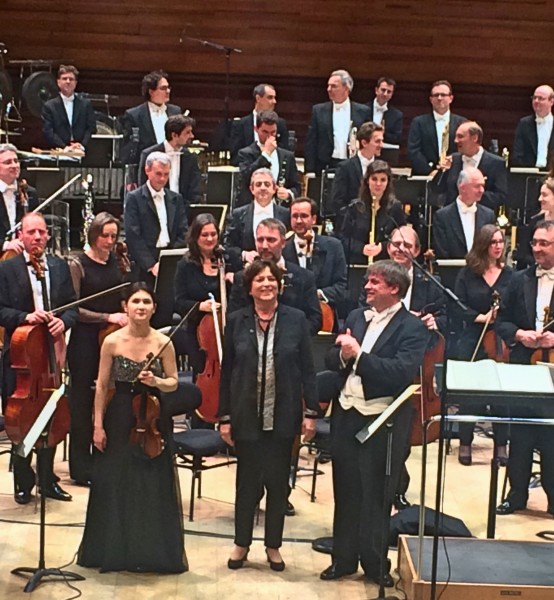Violin Concerto by Canat de Chizy world premiere
Violin Concerto by Edith Canat de Chizy
world premiere in Paris
by Henning Høholt

Applause after the world premiere of the violin concert MISSING by Edith Canat de Chizy, (center) performed by the Orchestra National de France conducted by John Storgårds (left) violin soloist Fanny Clamagirand (right). Foto Henning Høholt
PARIS/FRANCE: In the center of European Culture, (Paris) something new and interesting always happens. Thursday night it was a world premiere of a new violin voncerto by Edith Canat de Chizy, at the French Radio house with Fanny Clamagirand violin solo, and the French National Orchestra conducted by the Finish conductor John Storgårds
. It became a fascinating and interesting sound experience.
Edith Canat de Chizy, violin concerto Missing,
in memory of Devy Erlith.
The 20 minutes long new violin concerto gave me a great feeling of meeting something new in the music field, that i have never heard before. So to say that the instruments was the same, the tunes too, but in a strange way the composer, Edith Canat de Chizy, has renewed the way she used the instruments in combination with the usual normal use, sending some new sound signal in to the pattern, some new sound “effects”, without letting them stay alone, and putting it in to her own form of a violin concerto, that the orchestra very sporty and elegant followed up, with glissandi, vibrations, tempo changes, unawaited, and surprising combinations
. Using all the orchestra in an excellent way. Letting the violin soloists highest tunes being underlined by the virtuose piccolo flute, and a many other good arranged details.

Applause after the world premiere of the violin concert MISSING by Edith Canat de Chizy, (center) performed by the Orchestra National de France conducted by John Storgårds (right) violin soloist Fanny Clamagirand (left). Foto Henning Høholt
In the middle of all this the stabil and beautiful playing and looking soloist Fanny Clamagirand, stabil and safe playing her long notes, and all her “hysterically” complicated accents as contrasts to what we heard from the orchestra
. At sometime i had the feeling of being at a beautiful beach, with long virtuose harp passages as the back ground for the waves, that I could see, if I locked my eyes, some times the quietness of the sea change to storm and run weather. The observant and sporty conductor John Storgårds managed it all, stabil standing and sometimes jumping when needed, that underlined the powerful parts. I should have wished to listen to the violin concerto several times more, as I did when I many years ago reviewed Arne Nordheim world premiere with Arve Tellefsen with The Oslo Philharmonic
. – Then I had the possibility to follow some rehearsals, and that gave me, of course much more.
Edith Canat de Chizy, violin concerto Missing, is composed in memory of Devy Erlith who was professor at the Conservatoire national de musique in Paris. who died tragically in an accident 2012, 83 years old.

Applause after the world premiere of the violin concert MISSING by Edith Canat de Chizy, (center) performed by the Orchestra National de France conducted by John Storgårds (left) violin soloist Fanny Clamagirand (right). Foto Henning Høholt
Jean Sibelius: Pohjolas Daughter.
After the seven symphonies and the violin concerto, Sibelius’s thirteen symphonic poems are his most important works for orchestra and, along with the tone poems of Richard Strauss, represent some of the most important contributions to the genre since Franz Liszt. As a group, the symphonic poems span the entirety of Sibelius’s artistic career (the first was composed in 1892, while the last appeared in 1925), display the composer’s fascination with nature and Finnish mythology (particularly the Kalevala), and provide a comprehensive portrait of his stylistic maturation over time. Many years ago I had the pleasure to visit Lahti for the Sibelius festival, and that Year it was focused on the Poems.
With 8 December 2015 being the 150th anniversary of Sibelius’s birth, the Helsinki Music Centre presented an illustrated and narrated “Sibelius Finland Experience Show” . That i unfortunately could´t attend. The production is planned to extend over 2016 and 2017. On 8 December itself, the Helsinki Philharmonic Orchestra conducted by John Storgårds conducted a commemorative concert featuring En Saga, Luonnotar and the Seventh Symphony.
Sibelius wonderful poem, Pohjolas daughter was the ouverture this evening in paris
. The conductor John Storgårds has been going deep in to his knowledge of Sibelius works. Pohjolas Daughter has a wonder of powerful expression. It starts with a cello solo, beautiful played by Jean-Luc Bourné (?), and after this quiet feelingful opening the theme developed in the wind and going to the whole orchestra. I love the dramatic sequence nearly in the middle of the 14 minutes long piece. Musically a very representative opening of the evening.
Carl Nielsen: Four Temperaments, Symphony no 2.
After the break, Carl Nielsen: Symphony no 2. Four Temperaments, was the ending of the evening. The Orchestra plays fantastic and follow all the conductors ideas and tempi. Unfortunately, as being used to the music by Carl Nielsen, deeply since my time as Music chief of the Aalborg Symphony Orchestra, Denmark, I have been used to listening to the best versions of Carl Nielsen, including his Four Temperaments. Tonights version was not the best version I have heard. For me the fast tempi was rushing too much, and the powerful highlights was not being build up carefully enough, so we really could feel that the high points is on its way. The slowly parts could have been even more detailed and underlined. It seemed to me that John Storgårds had a feeling of that this was a kind of a show he had presented.
Perhaps a show of for Storgårds, but not for Carl Nielsen at its best.
